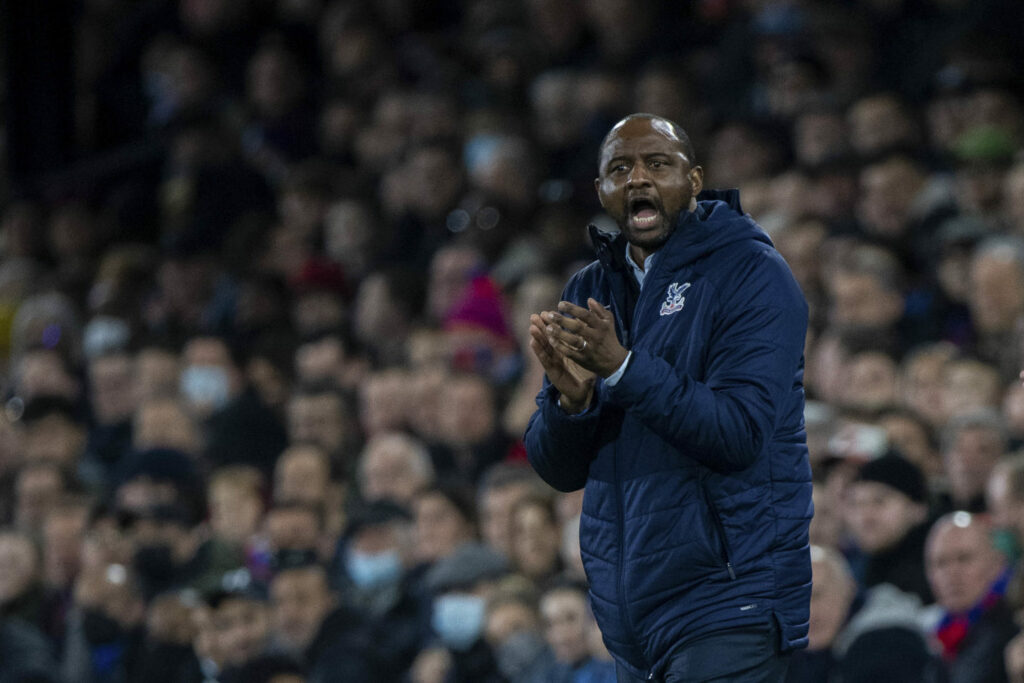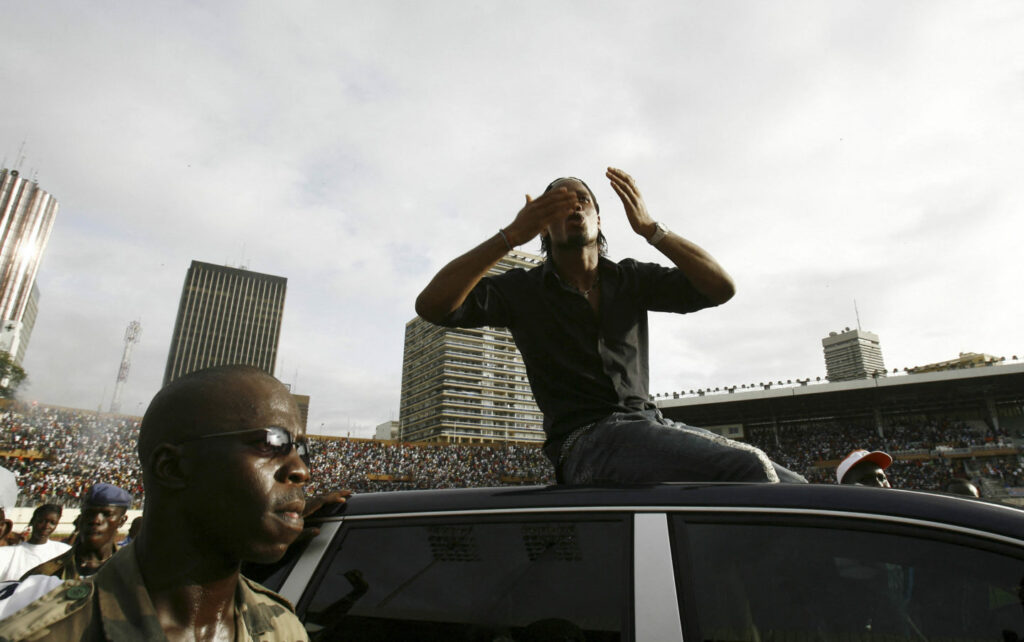Football fans parade in the streets of Yaounde during the Africa Cup of Nations. (Jean Pierre Kepseu/ Anadolu Agency)
Before a controversial ban on eight African countries by the United States and several nations in Europe owing to the discovery of the Omicron variant of Covid-19 by scientists in South Africa, the European Club Association (ECA) had written to world football governing body Fifa to express concerns over how rising cases of Omicron could endanger the participation of Europe-based African players at the Africa Cup of Nations (Afcon) starting on 9 January.
But this provocative move as well as the more recent angst over the Afcon rehash needless anxieties that play into a historical pattern of disrespect for Africa and the continent’s sporting traditions. That the ECA board expressed its “deep concerns” about whether players would be safe may be reasonable, but at the same time it invokes a culture of condescension that is normally encountered in the weeks leading to the all-important Afcon.
Negative coverage of the Afcon in the English press has abounded and included The Sun’s claim that Covid cases may leave the tournament in tatters and the Daily Mail’s headline that pejoratively screams a coming Afcon terror. But what is actually at play over the letter sent to Fifa by the ECA, led by English Premier League (EPL) clubs, is a hypocritical defence of players’ welfare that is used to hide an insidious logic of capital, which ultimately governs a so-called proposed boycott of the African tournament.
If EPL clubs indeed cared about the spread of Omicron during the Afcon, they would have completely paused, rather than postponed, EPL matches. They would have chosen the wellbeing of players they believe it is “the clubs’ duty to ensure” and properly protect, as they write in their letter to Fifa. But of course, as we saw at the onset of the pandemic, Premier League clubs voted to continue matches, despite the protestations of some players and coaches.
An ingrained attitude
A double-speak about the wellbeing of players aside, what is really at stake is a condescending attitude towards the Afcon that is ingrained in the culture of several European clubs. It is one that former Arsenal captain and coach of EPL side Crystal Palace, Patrick Vieira, recently decried when confronted with being without three players – Wilfried Zaha (Ivory Coast), Cheikou Kouyate (Senegal) and Jordan Ayew (Ghana) – when the tournament begins.
Insisting that the Afcon deserves more respect from European football authorities and their media outlets, Vieira explained that he respects and understands “the passion and the importance to players to go and represent their country” and will, therefore, “never stop any player going to play the Africa Cup of Nations”. But Vieira gets to the crux of the matter when he also demands that the “competition needs to be more respected – because this competition is as important as the European Championships”.
 Crystal Palace manager Patrick Vieira gestures during his team’s English Premier League match against West Ham United at Selhurst Park in London, England. (Photograph by Sebastian Frej/ MB Media/ Getty Images)
Crystal Palace manager Patrick Vieira gestures during his team’s English Premier League match against West Ham United at Selhurst Park in London, England. (Photograph by Sebastian Frej/ MB Media/ Getty Images)
It may be the case that the former France international is merely in some kind of sentimental league with his Senegalese roots, but his challenge to European journalists is clear: the Afcon deserves more respect and positive coverage. “It might be important for you guys to cover the Africa Cup of Nations a little bit more and to go to Africa and interview people to really understand what it means for every single one of them,” Vieira argued in his tacit denunciation of this Afcon condescension that is, frankly, now tiring.
It needs to be said that Vieira’s response is one more reason why diversity enriches an EPL – and indeed Europe’s top five leagues – that has a very limited number of Black managers. Though many have played as professional footballers at the highest level and obtained coaching licences from Uefa, they remain under-represented.
Like Vieira, former West Ham United striker Sebastien Haller, now with Ajax Amsterdam, expressed frustrations to De Telegraaf when asked if he preferred remaining in the Netherlands in January to going to Cameroon. “This statement shows the disrespect for Africa,” Haller said. “Would this ever have been presented to a European player towards a European Championship? Of course I will go to the Africa Cup to represent Ivory Coast. That is the highest honour.”
Racism and condescension
Vieira and Haller are not alone in calling out the discourteous attitude of some European clubs towards the Afcon. In 2013, a now former chief sports writer at the Daily Mail, Oliver Holt, similarly wrote that “the attitude to [the Afcon] from English clubs is still dominated by double standards… The tournament – which has been in existence longer than the European Championship, by the way – is treated as a giant inconvenience.”
The persistence of these double standards is why former England and Arsenal striker Ian Wright said in a video posted on Twitter that the media coverage of players travelling to the Afcon is “tinged with racism”. Wright’s question is telling: “Is there ever a tournament more disrespected than the Africa Cup of Nations?”
In a pandemic era, this pathetic idea of the Afcon as a tournament of inconvenience is being reiterated and mobilised to consolidate trite and twisted narratives about Africa as a place of crises and terror from which the rest of the world has to be protected. This despite Europe’s flagship football championship, the Uefa Euro, being hosted across 10 countries in the middle of a pandemic that has claimed fewer lives in Africa.
As things stand, Covid becomes a pretext once more to construct Africa as a sporting other. This returns us to a metaphysics of difference in which the continent is always already imagined as strange, different and dangerous. It is the ideological subtext for a tweet by the Daily Mail that suggested “there are real dangers” and “real risk of attacks in all Afcon venues”. To put it mildly, it’s all twaddle. It is the same and unending single story of woes and troubles that has been projected on Africa as the continent that would undoubtedly be devastated by Covid. This story has played out since the pandemic started and is now bursting its seams in the arena of sports. It all serves as a marker of Europe’s persistent condescension of Africa.
Of course, like anywhere else, some African countries have growing Covid numbers as well as social and political challenges, but the pandemic has been well managed on the continent. In many countries, the social production of everyday pleasures from theatres and restaurants to stadiums has neither been significantly curtailed nor totally abandoned because of some nightmarish predictions for Africa.
Africa taking charge
While there is a continuing conflict in the host nation for the Afcon, the 65-year history of the tournament shows it has always managed to overcome social unrest, even serving as a unifying factor in some cases. Admittedly, players and entire teams sometimes become vulnerable, as was experienced by the Togolese team in 2010, but it is also the case that football could become the means by which warring actors become permanently placated.
When Ivorian legend Didier Drogba asked in 2007 that a game be played in Bouake, a rebel stronghold, he got on his knees and pleaded with the rebels to drop their arms. Scoring a goal for Ivory Coast that helped them win the match against Madagascar, Drogba, many believe, contributed to the eventual termination of a five-year civil war in his country.
 Ivorian football star Didier Drogba does a lap around the Stade Félix Houphouët-Boigny stadium in Abidjan to salute fans during a ceremony staged in his honour. (Photograph by Issouf Sanogo/ AFP)
Ivorian football star Didier Drogba does a lap around the Stade Félix Houphouët-Boigny stadium in Abidjan to salute fans during a ceremony staged in his honour. (Photograph by Issouf Sanogo/ AFP)
Whether it’s the Honduras and El Salvador match that kicked off a war, or the famous Christmas football truce during World War I, sports and conflicts have coexisted in mutual tension all over the world. To treat Africa as different because of them or a pandemic is disrespectful.
Beyond the symbolism of a football event that has the potential power to undo unrest, there are certainly other material realities here, including whether condescension towards the continent is hinged on Africa’s infrastructural power and economic fortunes. Rather than become reactionary and endlessly complain about the ways Africa is narrated or covered in the media, though, we do need not only to write our stories but also take ourselves seriously as people with agency to transform our countries.
In the meantime, we must call out those who remain tethered to a single, incomplete narrative about us. Pretending that this edition of the Afcon poses danger is simply a disingenuous tactic that reprises a biennial tradition of disrespect towards African football by the European football elite, as we have seen with clubs like Watford and others choosing not to release players for the tournament.
As Omicron intensifies worldwide, African football authorities, in consultation with scientists and public health experts, need to decide what they wish to do with the Afcon. Similarly, any change in the timing of the tournament, which comes up from time to time in relation to the so-called disruption of European leagues, has to be a determination of the Confederation of African Football and not some European clubs and journalists holding on to a warped understanding of the continent. Based on Fifa regulations, the rules of the game are clear. If Covid permits and the risk to public health is minimal, then let the games begin.
This article was first published by New Frame.